'It's Not What I Do; It's Who I Am'
Cleveland Clinic nurses share their stories.
COVER STORY
By Tom Leland and John Soeder
Photos: Annie O'Neill, Lisa Dejong, Denise Ritchie, Chris Tongue and Elizabeth Priore
We want to introduce you to some very special people. Granted, that “very special” part is probably redundant. They’re nurses, after all. They’re here for us. They bring the care. Their empathy and compassion know no bounds. And leave it to them to provide a ray of hope, often in someone’s darkest hour. Nearly 35,000 nurses work across the Cleveland Clinic health system. In the following pages, you’ll meet a few of them. They have different backgrounds, different specialties and different levels of experience. But all of them have at least one thing in common: a selfless dedication to putting patients first. Read on, and we’re sure you’ll agree: When you’re looking at a nurse, you’re looking at the best in all of us.
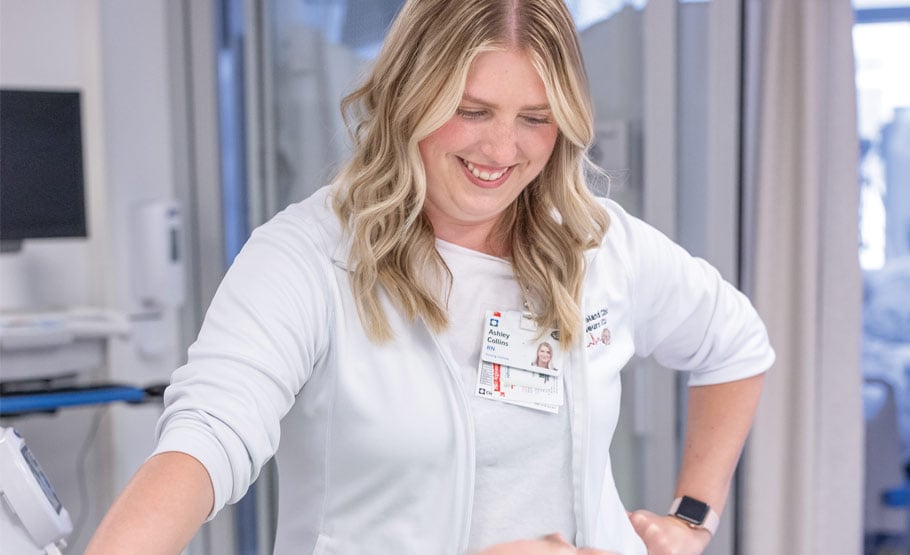
Ashley Collins
My life growing up wasn’t picture-perfect. I was placed in foster care at the age of 8, which was devastating. It separated me from my younger siblings. This was just the beginning of an emotional roller coaster. For years, I battled to overcome adversities. I longed for stability and the opportunity to care for my siblings. When I entered the workforce, I was quickly drawn to healthcare, as it gave me the opportunity to help someone during a challenging time in their life and embark on a fulfilling career. I wanted to use what I learned from my childhood struggles to make a positive impact on others’ lives.
My journey in healthcare began as a nursing assistant in a nursing home. In 2017, I became a clinical technician in the neuro ICU at Cleveland Clinic, which inspired me to become a registered nurse in 2018. It has been a privilege to be able to advocate for patients and their families every day and find a way to support those in need.
I’ve chosen to stay in the neuro ICU due to the positive culture, unmatched teamwork and professional development opportunities. I currently represent the neuro ICU as the Shared Governance Chair and Co-Chair of the Chief Nursing Officer Roundtable. I work closely with the Cleveland Clinic leadership team to develop action plans and solutions to the challenges that our nursing workforce faces.
It’s well-known that the pandemic has created healthcare staffing shortages, particularly in the nursing workforce. It’s crucial that we invest in all nurses and improve retention so that we can provide a continuity of exceptional care for all Cleveland Clinic patients. I’m honored to be able to advocate for my fellow nursing colleagues. I believe that together we can make the changes necessary to again make nursing one of the most fulfilling career choices.
I hope my story inspires someone young who may be facing some challenges to not give up, and that they too can break unhealthy cycles in their life.
Ashley Collins, BSN, RN, is a clinical care nurse on Cleveland Clinic’s main campus.
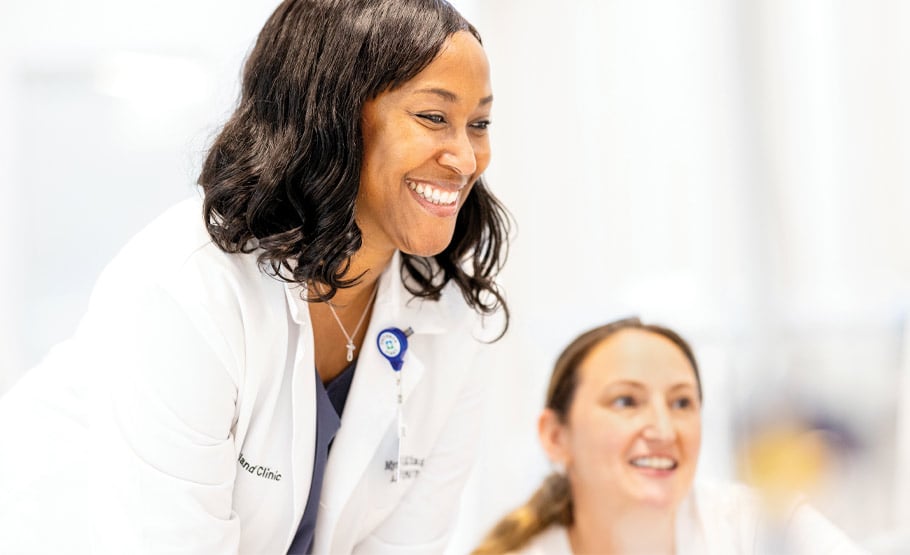
Photo: Lisa Dejong
Myra King
I always say that I didn’t find nursing; nursing found me. In high school I volunteered as a candy striper. The more I learned about nursing, the more I knew that it was the right fit for me. What I loved was spending time with patients and connecting with them, and I knew as a nurse I’d have that opportunity. Nursing suited my personality and my values — to show compassion, kindness and respect while promoting healing and relieving suffering. Nursing allows me to make a significant impact on the lives of others every day. For that, I am grateful and honored.
I can’t talk about my nursing career without talking about my father. Not long after I became a nurse, he was admitted as a patient into the same ICU where I was working. He suffered a cardiac arrest after having heart surgery and subsequently passed away. Obviously, it was a devastating way to begin my career. Though I was already passionate about being a nurse, that experience inspired me even further to devote my passion and commitment to the cardiac patient population.
Later I became a nurse educator, teaching new nurses in classes and at the bedside. I loved mentoring nurses, helping them become the best nurses they can be. Cleveland Clinic supported me in going back to school to become a clinical nurse specialist, and that has been my role since 2009.
Besides treating patients, I work in various ways to improve nursing practice, ensuring it’s aligned with the evidence. For instance, I’m currently working on projects that will prevent infections caused by central IV lines. In my career I’ve observed countless times when a skilled nurse has bolstered the mood of a patient facing dramatic health challenges, giving them hope. I’ve seen firsthand how nurses help patients become more resilient — and when a person is facing a difficult diagnosis, resilience is one of the things they need most. Nurses fulfill so many healthcare needs, but sometimes the most crucial is to be a sort of guiding light for patients, helping them navigate through their healthcare journey.
Myra King, DNP, APRN-CNS, ACNS-BC, CCRN-CSC, is a clinical nurse specialist manager at Cleveland Clinic’s main campus.
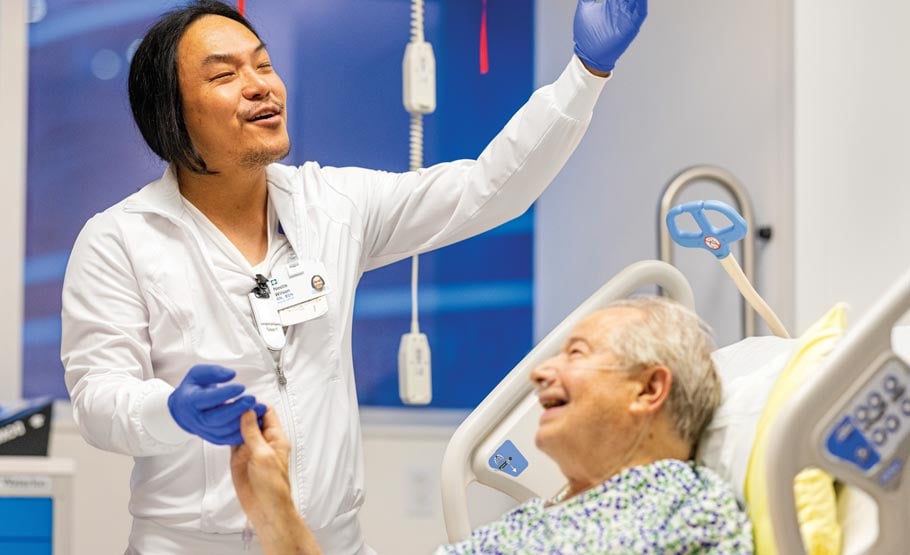
Photo: Lisa DeJong
Nestle Alonzo Wilson
Yes, my name is Nestle — like the candy. That’s how I usually introduce myself to patients. They always tell me, “Oh, you must be sweet.”
It’s hard not to make a personal connection with patients, especially if you use your heart to take care of them, like I do. I try my best to connect with people. I love singing to my patients. Music is a great way to make a connection. When I sing, hopefully I can make them forget any pain they may be experiencing, at least for a few moments. What I sing depends on the patient. If they’re older, it might be Doris Day: “Que sera sera ...” They love that. For someone from a different generation, I might try something else. Maybe Frank Sinatra: “When somebody loves you …” Or Elvis Presley: “Wise men say …” Or Etta James: “At laaast!” Sometimes they’ll start singing along with me. I’m trying to make them comfortable with letting me take care of them.
The toughest part of the job? Feeling someone else’s pain. When your heart connects with them, you feel their suffering. And that’s difficult as a nurse, not to be able to help them feel better right away. It hurts because you don’t just see them as a patient. You see them as one of your own family members.
It’s very hard for me, especially when I take care of older men, because I see my father. My father is sick back home in the Philippines. I can’t take care of him, but at least I can try to be my best self when I’m taking care of other people. My patients aren’t related to me personally, and we don’t know each other outside work. But they come to see me as somebody who genuinely cares about them. In a vulnerable state, they can feel the truthful self that you have in your heart as a nurse.
This is my passion. This is my destiny. Reaching out to people, getting to know them, looking after them. This is what defines me.
Nestle Alonzo Wilson, RN, works the night shift in the surgical ICU at Cleveland Clinic Fairview Hospital.
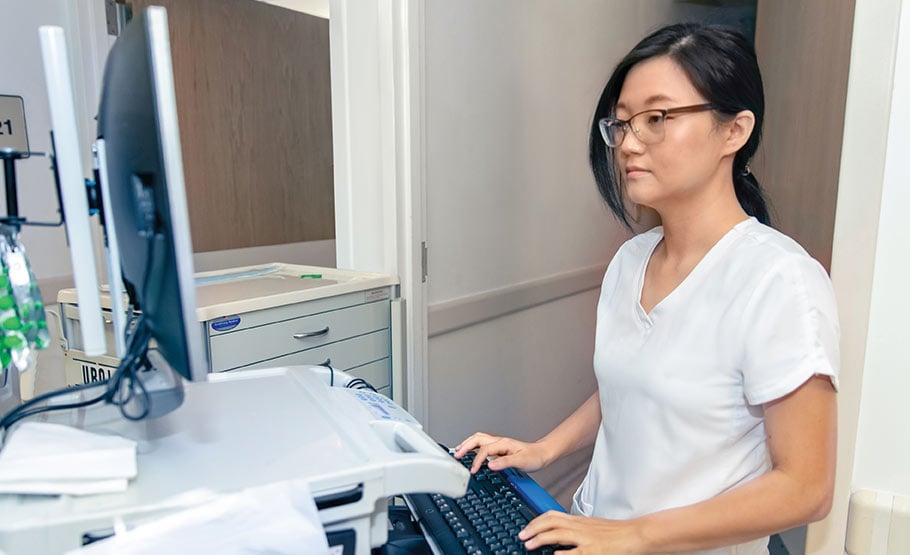
Photo: Denise Ritchie
Jiajia Wang
I’ve been a nurse at Cleveland Clinic Indian River Hospital for six years now. I work the night shift in a progressive care unit, which includes monitoring patients and cardiac care.
At age 15, I came to the U.S. from China. In 10th grade there was a program featuring occupational classes in different areas. I was interested in the health science program, and my teachers were retired nurses. I didn’t know much English, but they were very kind, always pulling me aside to ask if I needed extra explanation. The way they talked about nursing and their careers, how they helped patients, was all very inspiring.
Nurses are the front line in healthcare — patients are in contact with us the most. The doctors provide the checkups and the treatments; the surgeons do the surgeries; but the rest of the time a patient is in a hospital, they’re taken care of by a nurse. The nurse is often the first one to identify something isn’t right. They’re able to say, “This patient isn’t in the same condition that they’ve been in for the last 5, 10, 12 hours.”
Here in Florida, I take care of many patients in their 70s and 80s, and they often have comorbidities. It has become more and more challenging because people aren’t just coming for the winter — they’re moving here. So we have an increased number of patients and patient needs, but pretty much the same number of nurses. At the beginning of my career, it wasn’t uncommon to get a call telling me that I wasn’t needed on a given night, but I haven’t gotten one of those calls for maybe four years!
Jiajia Wang, RN, BSN, is a progressive care certified nurse at Cleveland Clinic Indian River Hospital in Florida.
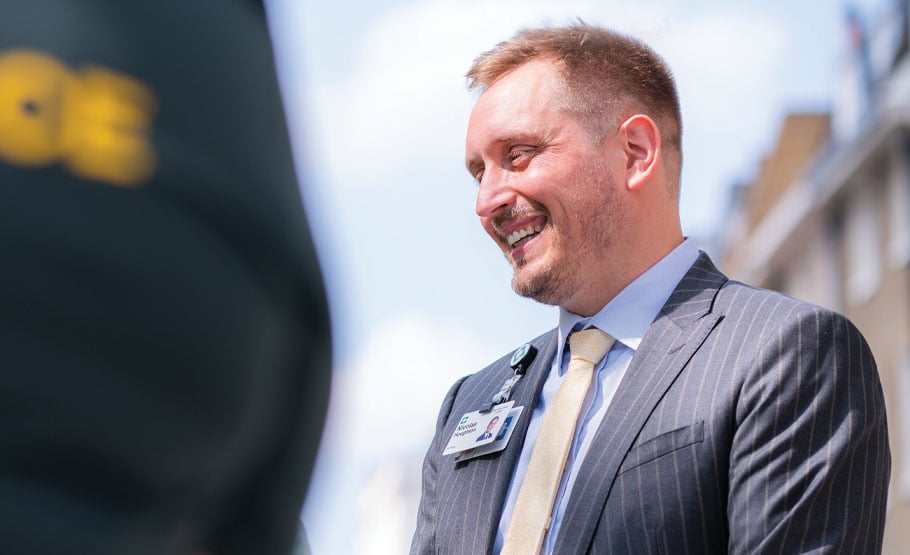
Photo: Chris Tongue
Nico Houghton
I like to joke that nursing is the best thing that accidentally ever happened to me.
I went to a liberal arts college, where I got a BA in sociology and anthropology. During my first semester, I took an EMT course. Really loved it. For the next four years, instead of going to parties, I spent my weekends riding around in an ambulance. It didn’t feel like a sustainable career, though. So I found a nursing program for people who already had a bachelor’s degree, which went right into a master’s program.
I’m a critical care nurse. I’m also a nurse practitioner. I was working on the East Coast in a surgical ICU when I saw a job come up at Cleveland Clinic on a nurse practitioner-led critical care transport team, which was a truly unique opportunity. That brought me to Cleveland in 2011. Eventually, I moved into leadership and became a manager for hospital medicine.
From there, I was lucky enough to be part of the team that opened Cleveland Clinic London — but not before the pandemic struck. Here I am, in a new city, in a new country, living by myself in lockdown and trying to help launch a new hospital from scratch. It’s hard to believe that working remotely, we were able to create nearly 1,000 workflows, policies and procedures, combining the best of the U.S. with the best of the U.K.
At the same time, with my background in critical care, I was eager to help during the pandemic in any way possible. Before the hospital opened last year, we were able to contribute to our community by volunteering to administer vaccines.
In my current role, I have fewer direct interactions with patients. However, the impact of the work that I do has been amplified. I’m designing systems of care and supporting those systems, ensuring that the folks who are delivering care have the tools they need to provide safe, effective and compassionate care.
Not everyone understands everything that nurses can do. For me, nursing has opened so many doors. It’s been a journey, and I’m still constantly learning.
Nico Houghton, DNP, MBA, ACNP-BC, is Director of Critical Care and Director of Advanced Practice at Cleveland Clinic London.
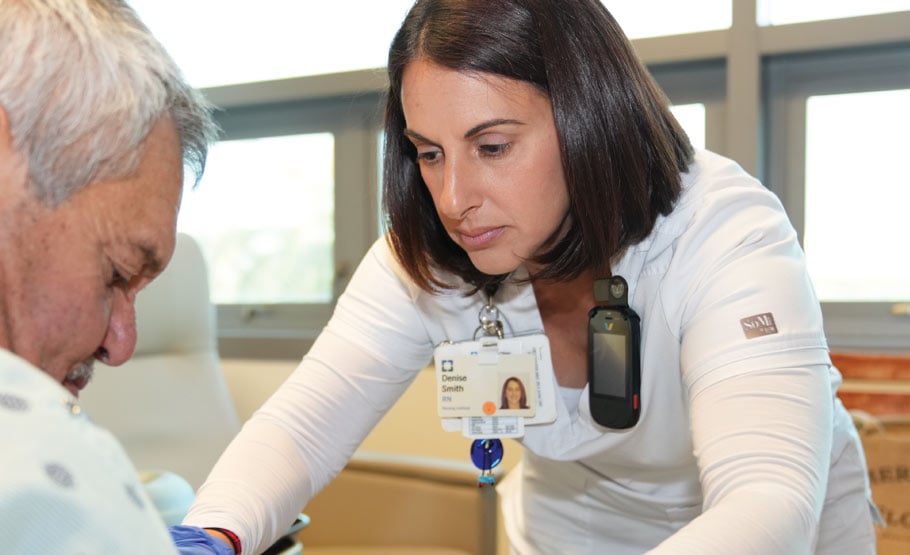
Photo: Elizabeth Priore
Denise Smith
A couple of years ago, a woman stopped me in Costco. She said, “Denise!” I didn’t recognize her at first. She said, “You were my nurse at Cleveland Clinic — I’ll never forget you!” You think, “Wow — I must’ve really made a difference.” It’s humbling.
Actually, I didn’t set out to become a nurse. I worked in the criminal justice system for a few years. Then my grandfather had a stroke. He’s very dear to me. I became part of his care team. When my family and friends saw everything that I was doing for him, they told me I would make a great nurse. So I went back to school for nursing, and here I am today, 15 years later.
I do a lot of work with novice nurses. Because of COVID, some of them couldn’t do clinical rotations during their schooling. I took them under my wing and helped them with hands-on skills. A big part of patient care is touch — just putting your hand on someone’s shoulder to let them know they’re in good hands. Not having to wear masks all the time anymore helps, too. Something as simple as a smile lets a patient know: “I’m here for you.”
Unfortunately, sometimes a prognosis is poor, and there’s only so much you can do. Still, you ask yourself: Could I have done anything different? Could I have done more? It can be challenging. Physically. Mentally. Emotionally. All of the above. Our No. 1 priority is taking care of everyone. Sometimes we forget ourselves.
During the pandemic, we lost so many experienced nurses. It was tough on those of us who stayed. But now it feels like we’ve turned the corner and we’re heading in the right direction.
I feel like I have the best of both worlds. I get to take care of patients and help them get better, and I get to share what I’ve learned with new nurses and watch them grow and flourish. I love what I do.
Denise Smith, RN, is an assistant nurse manager educator in a medical-surgical unit at Cleveland Clinic Weston Hospital in Florida.
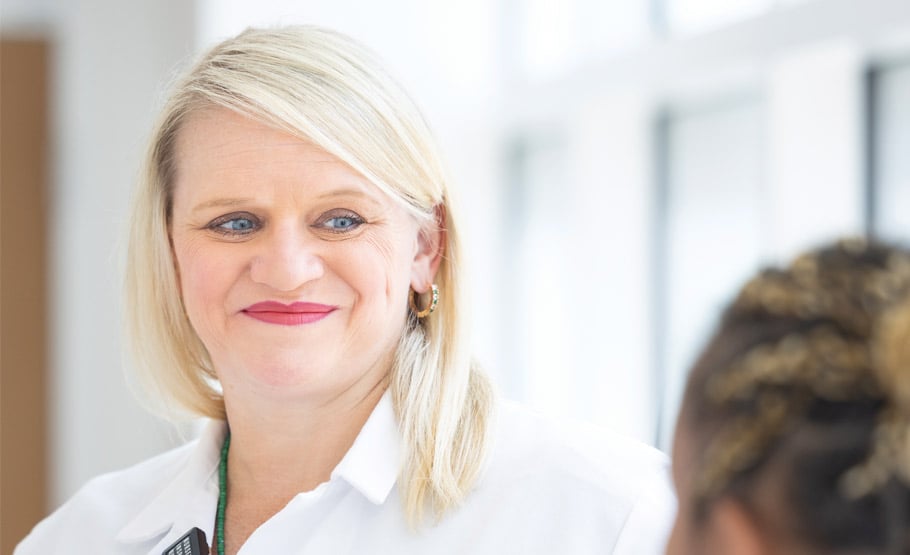
Photo: Annie O'Neill
‘People Will Always Need Nurses’
As Executive Chief Nursing Officer for the Cleveland Clinic health system, Meredith Foxx, MSN, MBA, APRN, NEA-BC, PCNS-BC, PPCNP-BC, CPON, leads nearly 35,000 nursing caregivers within the Stanley Shalom Zielony Institute for Nursing Excellence. She recently spoke to Cleveland Clinic Magazine about the big picture for the profession, as well as her personal journey in nursing.
You’ve been known to say about nursing: “It’s not what I do; it’s who I am.” What do you mean by that?
A nurse cares for others. It’s in my nature to be thinking of others. I always try to think of others first, regardless of the situation.
Even when I’m not at work, I’m still a nurse. It doesn’t go away. I’m assessing people around me, whether I’m working out in a fitness club or standing in line to get on a plane or dining in a restaurant. I’m thinking, “Is that person over there all right?”
Wherever I am, I’m always a nurse, just making sure people are OK.
So when you’re a nurse, it’s intrinsically intertwined with your identity?
Absolutely!
What makes a good nurse? Do people who do well in this career tend to have certain attributes in common?
For most people, the first thing that comes to mind is being caring. But I think it goes beyond that.
It’s not just about being caring. You have to be competent. You have to be empathetic. You have to be smart. You have to be engaging. You have to be assertive.
You have to be proactive, too. You have to be proactive for yourself to be proactive for your patients. How do you meet their needs?
One of our chief nurses put it this way: What is the “what”? In other words, what is it that the patient needs today? It might not be about medications to make them feel better. For the patient, the “what” might be knowing that while they’re in the hospital, someone is taking care of their dog at home.
When you’re a nurse, you have to recognize the needs of the patient and advocate for them.
We’ve all heard about the challenges facing the nursing profession, from workforce shortages to career burnout. How is Cleveland Clinic rising to those challenges?
We need more nurses, first and foremost. Creating pipelines of interested and enthusiastic young people to consider careers in nursing is key.
A great example is our ASPIRE program. It removes barriers to a successful nursing career for high school students from underrepresented backgrounds, thanks to the vision of donors Nick and Lorie Howley, Cleveland Clinic Chief Caregiver Officer K. Kelly Hancock and other supporters. Now the program is expanding beyond nursing to include pathways to other healthcare careers.
We continue to work closely with our academic partners, too. We have a well-established roundtable where we meet regularly with the deans of Ohio nursing schools for open dialogue on high-priority topics, and we’re starting a similar roundtable in Florida. How do we stay innovative when it comes to using our clinical sites for education? That’s our bailiwick.
For the first time in decades, nursing school enrollment is down. We need to figure out how to reach a diverse pool of even younger students and get them excited about everything that nurses do.
We also need to make sure that for the nurses we already have, Cleveland Clinic remains the best place to work in healthcare.
To that end, a sense of lifelong learning is so important. We have to provide opportunities for lifelong learning for our nurses, whether it’s learning about a new diagnosis, learning about a new treatment plan or just learning in general for their own well-being and professional development. It comes down to making sure
that our nurses have plenty of room to grow in their careers.
How is being a nurse at Cleveland Clinic different from being a nurse elsewhere?
We have every specialty in every setting, from Ohio to Florida to Las Vegas to Abu Dhabi to London. What do you want to do? Do you want to work in a fast-paced ICU? Or in a home setting? Or on a critical care transport team? Or in research, education or leadership? When you’re a nurse at Cleveland Clinic, the opportunities are endless.
Going back to this idea of lifelong learning, Cleveland Clinic is ready to help nurses develop professionally. I can speak from personal experience. I’ve had coaches. I’ve had mentors. I’ve had continuing education. It’s all part of the support network that comes with being a caregiver here.
I’ve been a nurse for nearly 25 years. For 20 of those years, I’ve been at Cleveland Clinic. I truly believe this is the best place to work as a nurse.
What drew you to nursing in the first place?
I have nurses in my family, and I definitely wanted a career that was people-focused. Specifically, I wanted to work with children. So my specialty is pediatrics.
I was fortunate to attend one of the top nursing schools in the country, the University of Pennsylvania, where you were challenged to take your nursing career to the next level.
I ended up in nursing leadership organically. I love mentoring people and helping them take the next steps in their careers.
I’m very proud to be a nurse. For anyone, this career can lead down a pathway with so many different opportunities — great opportunities.
Nursing isn’t going away, no matter what.
Thank goodness.
Nursing continues to be the most trusted profession, year after year. Yes, it’s hard work. But it’s a long-lasting career.
No matter how much healthcare evolves, people will always need nurses. Even with all the technological innovations in medicine, there will always be a place for nurses. We need their brains. We need their hearts. And we need good people to take care of us.
Next Steps
With generous support from donors, Cleveland Clinic creates stepping stones like these to nursing success:
The Howley ASPIRE Program provides scholarships and stipends for high school students from minority groups, opening pathways to healthcare careers and building a new generation of diverse and expertly trained nurses.
The Nurse Associate Externship Program is an immersive and highly competitive summer program for nursing students, who work alongside Cleveland Clinic RNs, earning pay and joining their mentors on eight- to 12-hour shifts.
THRIVE is a revolutionary work-readiness program that teaches life skills and provides ongoing career coaching to patient care nursing assistants (PCNAs), who are vital to care teams.
The Office of Nursing Research and Innovation ensures that our nurses have the resources and the backing to investigate, grow and share their biggest ideas.
Through continuing education, Cleveland Clinic empowers nurses to further their careers with scholarships and tuition coverage for advanced degrees; resources to pursue specialization; training to become nurse leaders; and other opportunities.
Our goal: Raise $150 million to attract and educate the nurses of tomorrow, and retain and develop the nurses of today. Will you please help? To make a gift, click here.


















